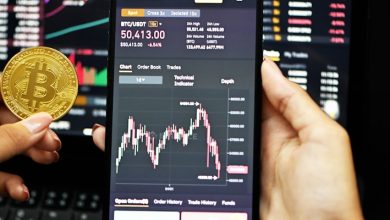How Blockchain is Influencing the Future of Gaming

- The Rise of Blockchain Technology in the Gaming Industry
- Revolutionizing In-Game Economies with Blockchain
- Enhancing Security and Transparency in Gaming with Blockchain
- Exploring Decentralized Gaming Platforms Powered by Blockchain
- Tokenization of Gaming Assets: A Game-Changer for the Industry
- The Potential of Blockchain to Transform the Gaming Experience
The Rise of Blockchain Technology in the Gaming Industry
Blockchain technology has been making waves in the gaming industry in recent years, revolutionizing the way games are developed, distributed, and played. This innovative technology offers a decentralized and secure platform for gamers to buy, sell, and trade in-game assets without the need for intermediaries.
One of the key advantages of blockchain in gaming is the concept of true ownership. By utilizing blockchain technology, players have full control over their virtual assets, such as skins, weapons, and characters. This means that players can transfer or sell their in-game items outside of the game environment, opening up a whole new world of possibilities for gamers.
Moreover, blockchain technology also enhances the transparency and security of gaming transactions. The use of smart contracts ensures that all transactions are recorded on the blockchain, making them tamper-proof and secure. This not only protects gamers from fraud but also provides a level playing field for all participants.
Another significant impact of blockchain technology on the gaming industry is the rise of decentralized gaming platforms. These platforms leverage blockchain to create a trustless environment where players can engage in peer-to-peer gaming without the need for a central authority. This not only reduces transaction costs but also eliminates the risk of censorship or control by a single entity.
Overall, the integration of blockchain technology in the gaming industry is set to revolutionize the way games are created, played, and monetized. With its focus on ownership, transparency, and decentralization, blockchain is paving the way for a more inclusive and innovative gaming ecosystem. As the technology continues to evolve, we can expect to see even more exciting developments in the intersection of blockchain and gaming in the future.
Revolutionizing In-Game Economies with Blockchain
Blockchain technology has the potential to revolutionize in-game economies in the world of gaming. By utilizing blockchain, game developers can create secure and transparent systems for managing virtual assets within games. This technology enables players to truly own their in-game items, as they are stored on the blockchain in a decentralized manner.
One of the key benefits of using blockchain in gaming is the ability to prevent fraud and counterfeit items. With blockchain, each virtual asset is assigned a unique digital signature, making it impossible to duplicate or manipulate. This enhances the overall gaming experience for players, as they can trust that the items they acquire are authentic and valuable.
Furthermore, blockchain allows for seamless and secure transactions between players. Through smart contracts, players can buy, sell, or trade virtual assets with each other without the need for intermediaries. This not only streamlines the in-game economy but also reduces transaction fees and processing times.
Overall, the integration of blockchain in gaming has the potential to transform the way in-game economies operate. By providing a secure and transparent system for managing virtual assets, blockchain technology empowers players and developers alike to create a more immersive and efficient gaming experience.
Enhancing Security and Transparency in Gaming with Blockchain
One of the key ways in which blockchain technology is influencing the future of gaming is by enhancing security and transparency within the industry. By utilizing blockchain, game developers can create secure and tamper-proof systems that protect user data and prevent cheating.
Through the use of smart contracts, blockchain technology can also ensure that in-game transactions are transparent and fair. This not only benefits players by providing a level playing field, but also helps to build trust between developers and their user base.
Furthermore, blockchain can be used to verify the authenticity of in-game items and assets, reducing the risk of fraud and counterfeit goods within the gaming ecosystem. This added layer of security can help to protect both players and developers from malicious actors.
Exploring Decentralized Gaming Platforms Powered by Blockchain
Decentralized gaming platforms powered by blockchain technology are revolutionizing the gaming industry. By utilizing blockchain, these platforms offer increased transparency, security, and trust for gamers. Players can enjoy a more fair and trustworthy gaming experience, knowing that the outcomes are determined by smart contracts and cannot be manipulated.
One of the key advantages of decentralized gaming platforms is the ability for players to truly own their in-game assets. Through blockchain technology, players have full control over their digital items, which can be bought, sold, or traded on decentralized marketplaces. This opens up a new world of possibilities for gamers, allowing them to monetize their gaming achievements in a secure and transparent manner.
Furthermore, decentralized gaming platforms often incorporate non-fungible tokens (NFTs) to represent unique in-game assets. These NFTs are stored on the blockchain, ensuring their authenticity and scarcity. Players can collect rare items, participate in unique events, and even earn rewards through blockchain-based games.
Overall, decentralized gaming platforms powered by blockchain are shaping the future of gaming by providing a more equitable and transparent environment for players. As this technology continues to evolve, we can expect to see even more innovative and immersive gaming experiences that leverage the power of blockchain.
Tokenization of Gaming Assets: A Game-Changer for the Industry
One of the most revolutionary aspects of blockchain technology in the gaming industry is the tokenization of gaming assets. This game-changing development allows for the creation of unique digital tokens that represent in-game items, characters, or even entire virtual worlds. These tokens can be bought, sold, and traded on blockchain-based platforms, providing gamers with true ownership of their virtual possessions.
Tokenization has the potential to completely transform the way gamers interact with virtual assets. In traditional gaming, players often spend significant amounts of time and money acquiring rare items or characters, only to be limited by the game’s terms of service when it comes to trading or selling them. With tokenization, players have the freedom to buy, sell, and trade their assets as they see fit, creating a new level of flexibility and value in the gaming ecosystem.
By tokenizing gaming assets, developers can also introduce new revenue streams and business models. For example, they can create limited edition tokens for special events or collaborations, driving excitement and engagement among players. Additionally, developers can offer players the opportunity to stake their tokens in exchange for rewards or exclusive in-game benefits, further enhancing the gaming experience.
The Potential of Blockchain to Transform the Gaming Experience
Blockchain technology has the potential to revolutionize the gaming experience in a variety of ways. By leveraging decentralized ledgers, blockchain can enhance security, transparency, and trust in online gaming platforms. This can help prevent issues such as cheating, fraud, and account hacking, creating a safer and more enjoyable environment for players.
Moreover, blockchain can enable true ownership of in-game assets, allowing players to buy, sell, and trade digital items with greater ease and security. This opens up new possibilities for monetization and customization within games, as well as fostering a more vibrant player-driven economy.
Additionally, blockchain can facilitate unique gameplay experiences through features like provably fair gaming, verifiable scarcity of virtual goods, and decentralized governance mechanisms. This can lead to more immersive and engaging gameplay, as well as opportunities for players to shape the direction of their favorite games.
Overall, the integration of blockchain into the gaming industry has the potential to transform the way games are played, developed, and monetized. As developers continue to explore the possibilities of this technology, we can expect to see a new era of innovation and creativity in the gaming world.



